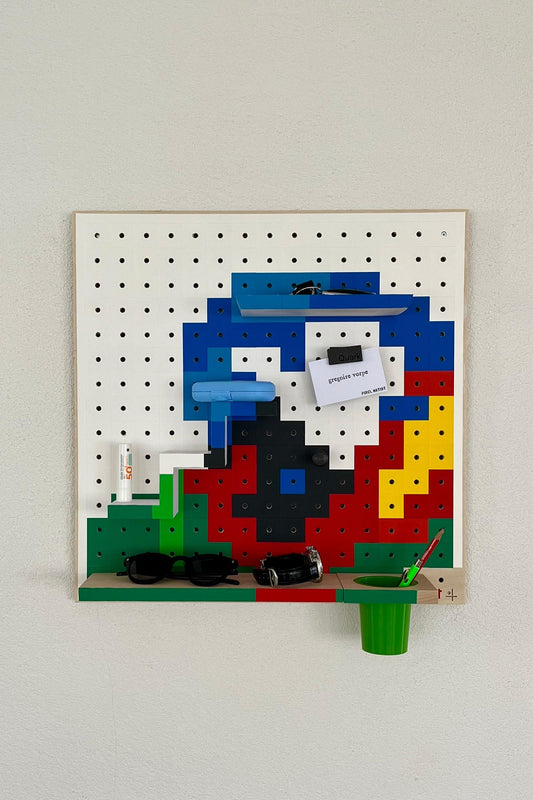Hello everyone ! Discover Quark, a resolutely committed storage solutions design and manufacturing company, created in 2020. Our workshop is located in an urban area, a detail that reflects our commitment to sustainable production.
What is sustainable production
Here is a definition of sustainable production in order to converge on a common idea. Sustainable production is an approach to object manufacturing. The objective is to minimize the environmental and social impact throughout the life cycle of a product. From the production process to the use and end of life of a product.
We can identify several aspects in sustainable production: The responsible use of natural resources , the reduction of greenhouse gas emissions, the preservation of biodiversity, the promotion of fair working conditions , as well as the reduction of waste and pollution .
Companies committed to sustainable production seek to adopt environmentally friendly practices, for example by promoting the use of recycled or biodegradable materials. By optimizing the energy efficiency of installations, or by reducing emissions of harmful substances.
They are also committed to ensuring safe and fair working conditions for their employees. By ensuring respect for human rights and the fight against discrimination. It is obvious that all these challenges cannot be solved in one day. Small businesses cannot meet these challenges alone either. But this approach can be considered as an objective to be achieved within 15 years . It is therefore a course to guide business practices more than a certification label.
The objective of sustainable production is thus to achieve a balance between economic , social and environmental imperatives. By contributing to the preservation of natural resources, the fight against climate change, and the improvement of the quality of life of workers and local communities.

The word "new" in sign language
What are the benefits of sustainable production for countries and why support companies committed to this approach?
Sustainable production offers many benefits, both economically and socially. Companies that invest in sustainable production often see enhanced competitiveness, long-term savings and sustainable job creation. In addition, sustainable production promotes improved health and well-being, as well as environmental protection.
The multiple economic, social and environmental benefits of this productive practice: A non-exhaustive list:
- Strengthening competitiveness : companies committed to sustainable production invest in research and development in order to find innovative products that meet the needs of a world in transition. The intellectual property generated is valued for accounting purposes and also opens the doors to new markets.
- Long-term cost savings : While transitioning to sustainable practices requires upfront investment, it leads to long-term savings. For example, adopting energy-efficient technologies can reduce electricity bills. As well as the effective management of waste which will reduce the costs associated with its management. Finally, resource optimization can reduce procurement-related expenses.
- Creation of sustainable jobs : the transition to sustainable production models creates new job opportunities in sectors such as renewable energies, eco-design, waste management, ecological restoration, etc. These jobs offer decent working conditions and contribute to the country's economic development (income, investment, tax revenue).
- Improved health and well-being : Sustainable production promotes the reduction of toxic substances and pollutants in products and manufacturing processes. This has an immediate impact on the health of production teams, consumers and the general population.
- Environmental protection : finally, sustainable production reduces the ecological footprint by minimizing the consumption of natural resources, preventing air, water and soil pollution. This contributes to the preservation of biodiversity, the fight against climate change and the conservation of ecosystems.

Machine in a workshop in an urban area
How can we act to promote this approach?
There are several ways to promote sustainable production at local, national and European level. We propose three levers of action: legislating on transparency, promoting sustainable practices through market access and promoting an economy of use.
Transparency is crucial. Governments should pass laws requiring companies to publish detailed information about the origin of their raw materials and the working conditions of their employees.
Market access can also be used to promote sustainable practices. Elected officials can support companies that engage in sustainable practices by creating conditions for market access at several levels.
Finally, promoting an economy of use rather than the consumption of objects can support the transition to a more sustainable economy.
Call on governments to legislate on transparency
Supply chains and production methods. Engaged brands must put pressure on governments to pass laws that oblige companies. As well as publishing detailed information on the origin of their raw materials and the working conditions of their employees, all along the value chain. Transparency is the first step towards improving working conditions and reducing environmental impacts.
Promoting sustainable practices through market access
Local and national operators can support through concrete actions of sustainable production through market access. This would be one of the most drastic measures. Elected officials can thus support companies that engage in sustainable practices by creating market access conditions at several levels. We can imagine selection criteria to obtain the right to open points of sale, marketing rights or even a mandatory label to respond to public tenders. This would economically encourage a positive transformation of the industry. It is time to recognize that the quality of products should not be limited to their price, but also to their environmental and social impact.
Valuing an economy of use
Many people recognize that consuming better is now an ecological necessity. By questioning our consumer behavior and supporting committed brands, we can build a fairer and more sustainable economy. We can create cost-effective solutions to support the consumption of use rather than the consumption of objects. It is not a question of eliminating the right to property, but rather of promoting and proposing new economic models. The cost of the transition must be assumed collectively to build a desirable future for all.
Define and commit to a common direction
By joining forces and focusing on transparency, sustainable practices and changing consumption patterns, we can create a significant impact in our society and build a future that is more respectful of the environment and people . We believe that it is time to open a transparent debate on the economic and social practices that we wish to support . We will thus be able to collectively define transparent conditions to bring out a fabric of responsible actors. These actions seem necessary to us in order to create the conditions for a sustainable economy for all.












